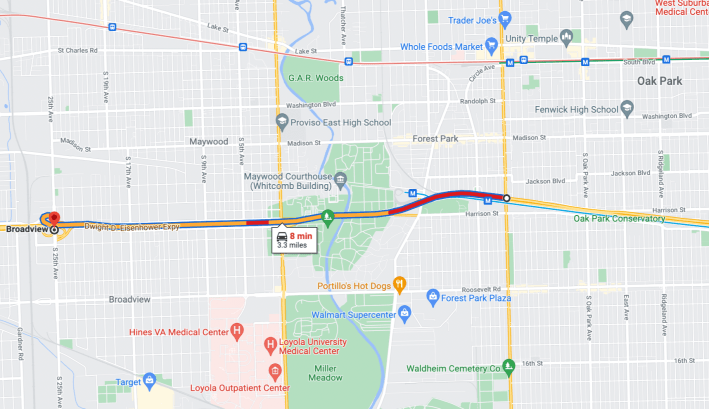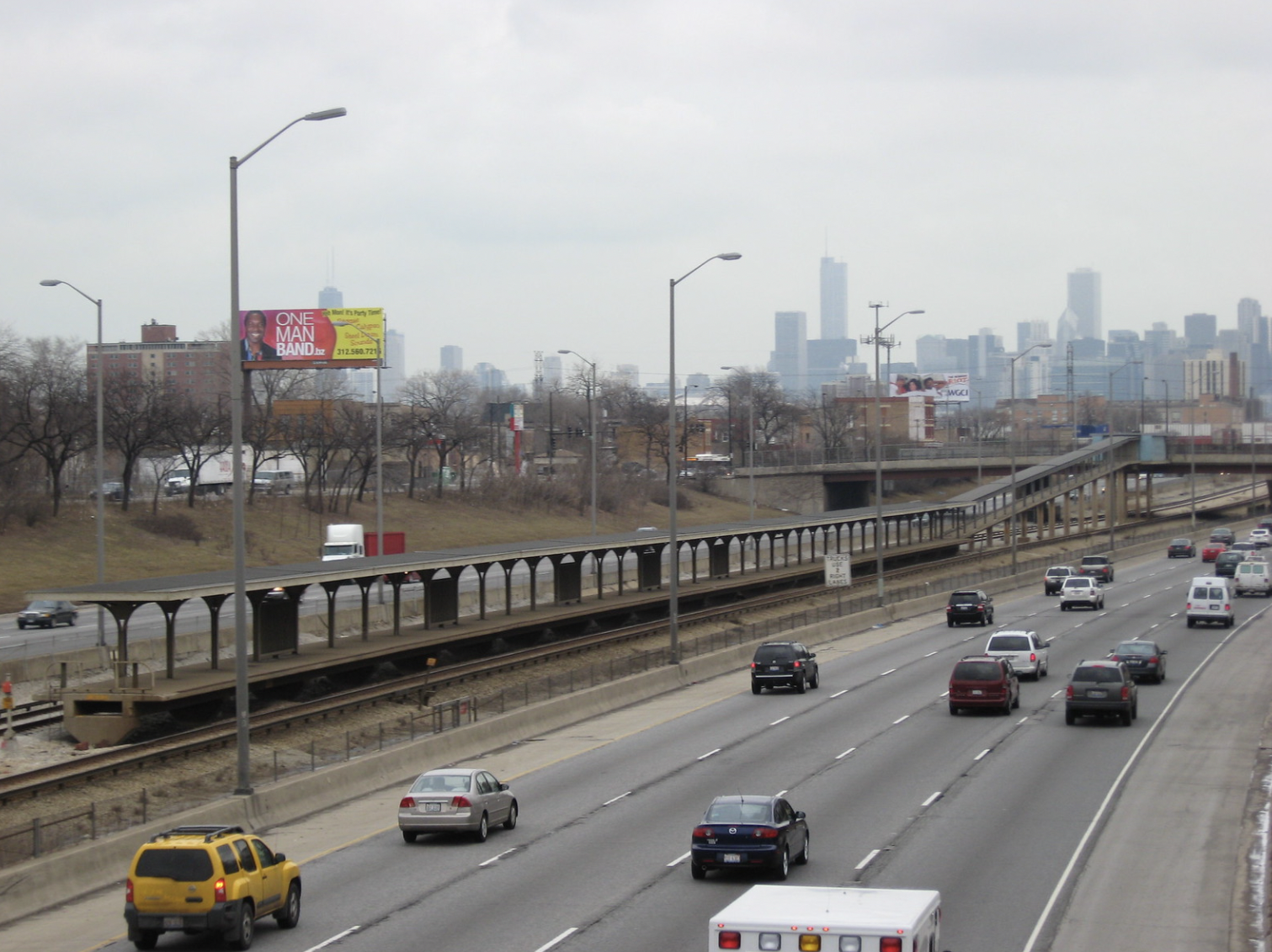Thanks to the recently-passed $1.2 trillion federal infrastructure bill, Illinois is expected to get $17 billion in funding that can be used for walking, biking, and transit facilities; roads, bridges, and more. It's an opportunity to address past mistakes by making our state's transportation network safer, more equitable, more environmentally friendly, and more efficient by encouraging sustainable modes. We're likely to see some progress in that direction, such as funding allocated for building the Red Line extension and making existing transit stations accessible to people with disabilities.
But at the same time, maddeningly, state and Chicago officials are eager to double down on the car-centric status quo by using the influx of federal cash to not just rebuild but expand expressways.
On November 9, a who's who of state and local leaders showed up for a downtown press conference calling for a spending $2.7 billion to reconstruct and widen the Eisenhower Expressway between Racine Avenue in Chicago and Wolf Road in west-suburban Hillside. Disappointingly, even supposedly-progressive Chicago Department of Transportation chief Gia Biagi attended the event to show her support for the highway expansion project.
There's no question that the I-290 corridor needs attention, particularly the dilapidated Forest Park branch of the Blue Line, which runs in the median of the highway. And supporters of the plan promise that the project will include adjacent bike and pedestrian improvements, such as wider sidewalks, plazas, and lighting upgrades.

But the dealbreaker is that the plan includes adding a lane in each direction on the roughly three-mile-long stretch between 25th Avenue in Broadview and Austin Avenue in Oak Park, expanding an already massive expressway. Yes, the backers note that express buses would be able to use these lanes. (The Blue Line ends several blocks west of Harlem.) But some drivers would be able to use them as well, which means the time-saving for bus riders would be limited. And there would be more capacity than ever for drivers, which means more overall driving. That's the opposite approach we should be taking to reduce emissions at a time when Chicago's beaches are disappearing due to climate change and even electric vehicles pollute heavily through brake dust and tire particles.
But I'm sorry Speaker @ChrisWelch_JD was late to the downtown press conference due to driver-created congestion. If only there was a way he could get from his home in Hillside to Chicago without having to sit in traffic jams! pic.twitter.com/OLBnFhztpz
— John Greenfield (@greenfieldjohn) November 10, 2021
Welch's explanation for his tardiness was highly ironic, because a $105 million project to "fix" the Strangler back in the early 2000s was a textbook example of how throwing money at road expansion projects does little or nothing to prevent traffic jams. Jon Hilkevitch, a former Chicago Tribune transportation reporter who wrote several articles about the project at the time, explained it to me thusly: "The Strangler project simply moved the traffic bottleneck from the Hillside area to farther east on the Ike," he said. "I have little optimism that the new proposed project will have the positive results IDOT is pitching. The daily number of vehicles outstrips capacity. I think it would take 12 lanes in each direction to produce free-flowing traffic. We're not Texas, thankfully."
Today the Chicago Tribune noted that IDOT also plans to add two lanes to the Stevenson Expressway (I-55) from the Tri-State Tollway to downtown Chicago, and one lane each way from the Tri-State to I-355, which is projected to cost a billion dollars. The department also wants to add two lanes on I-55 through Springfield, I-57 further south, and I-270 in the Illinois portion of the St. Louis metropolitan region.
Sustainable transportation advocates agree that these road-widening schemes are wrongheaded. "It would be irresponsible for our region to plow ahead with highway expansion projects that would further harm our air quality, worsen the impacts of climate change, and limit access for our most vulnerable neighbors," said Active Transportation Alliance spokesperson Kyle Whitehead. "It’s been proven these projects don’t deliver lasting congestion relief, so why do state and city officials keep pretending they will? We need transparent, inclusive processes for spending these federal funds that consider the long-term impacts on quality of life in our neighborhoods – not more of the same false promises."
Metropolitan Planning Council Transportation director Audrey Wennink concurred. "For every transportation proposal we must seriously consider the climate, equity and safety impacts," she said. "Roadway widenings are known to induce more vehicle miles traveled, which will result in negative climate impacts as shown in this induced demand calculator. Given the urgency of the climate and traffic safety crises, we must make every attempt to reduce vehicle miles traveled by providing transit alternatives and guiding development patterns to support sustainable modes of transportation.
And transportation analyst Yonah Freemark noted that even though Illinois is controlled by the Democratic Party, which, unlike the GOP, has fully acknowledged the threat posed by climate change, our leaders are still lining up behind plans that will encourage more driving and greenhouse gas production. (The Chicago City Council also declared a climate change emergency last year.)
Illinois, a state with full Democratic control & that committed to advance the emissions-reduction goals of the Paris climate agreement https://t.co/WcsjRkWm5O, has a DOT that wants to use federal funds to:
— Yonah Freemark (@yfreemark) November 22, 2021
-Widen I-290
-Widen I-55
-Widen I-57
-Widen I-270https://t.co/oAFAKYxVYq
"Like almost every state," Freemark wrote, "Illinois isn't taking climate change seriously."





